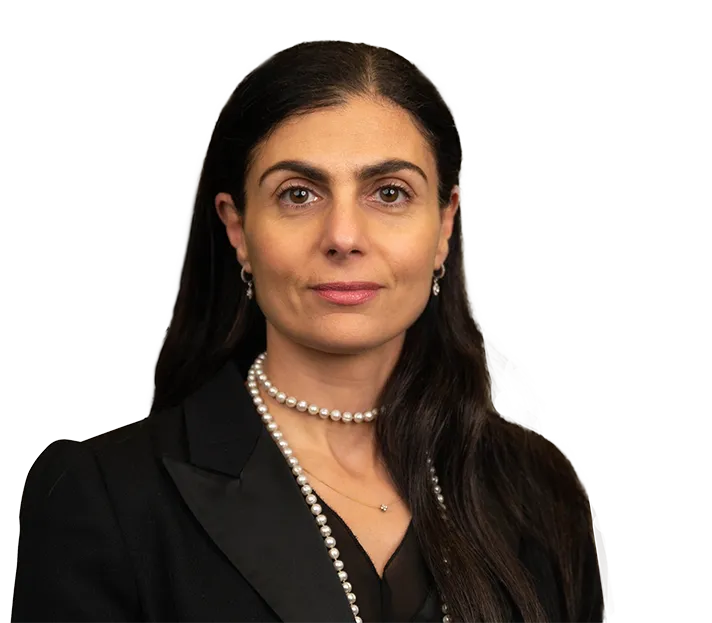
Maria Karaiskos KC, recently appointed as the first female head of Church Court Chambers, discusses breaking down barriers, the lure of the courtroom, and the power of storytelling
What was your route into the profession?
I didn’t come from a long line—or any line—of barristers or judges. Quite the opposite. I came into law because I enjoyed language, analysis, the art of persuasion and most importantly, helping people. I studied Law at UCL, but even before that, I had an interest in performing. I loved acting as a teenager, and once auditioned for a part on the jury panel in Twelve Angry Men arranged by my local theatre. From those early years, I suspect I was always drawn to the courtroom.
After university and successfully completing the Bar exams, I worked in a law firm in Canada before I returned to London to start pupillage. From then on, I gradually built up a criminal practice—both prosecuting and defending. The seriousness of criminal work, the ethical weight it carries, and the human interaction are what inspire me. It is a demanding profession, and certainly not glamorous, but it is deeply meaningful, varied and intellectually stimulating.
As a criminal barrister, you develop skills which are transferrable to other roles: for instance, sitting as a judge in court or on a tribunal. In 2017 I was appointed as a deputy district judge in the Magistrates’ Court, and in 2018 I was appointed as a recorder in the Crown Court.
What has been your biggest career challenge so far?
Without question, juggling the intensity of criminal law with being a mother. There were moments when I wondered if it was even possible to keep up with court deadlines, heavy trials, and the emotional weight of criminal cases, while also being present at home. There were people who said it could not be done and that motherhood and silk were not compatible. I guess that just made me more determined.
But it’s a constant negotiation and balance: between ambition and presence, between your professional duty and your personal life. Sometimes the challenge isn’t just practical, it’s emotional: hearing deeply disturbing evidence during the day, then coming home to bedtime stories. That switch can be jarring. But it also reminds me why it is important to get some headspace.
Which person within the legal profession inspires you most?
There isn’t one single person in our legal profession as I have been fortunate to be mentored and supported by lots of truly brilliant people: silks who quietly open doors for others, judges who lead with compassion, peers who remind you that excellence and empathy are not incompatible. That is what I love so much about Church Court Chambers: they are such kind and supportive professionals.
When I was first called to the Bar, I was told by an unnamed individual that I should change my surname (to make it sound less foreign). Comments like that are so disappointing—they just made me more intent on breaking down these stereotypical barriers.
My lifelong role models are without a doubt my parents: hardworking, courageous, first-generation immigrants who had a dream and sacrificed so much to educate their four children.
If you weren’t a lawyer, what would you choose as an alternate career?
Probably an actor—isn’t that what most barristers say?! I loved drama as a teenager and still find the rhythm of performance in what we do in court. There is something very human about storytelling; and advocacy at its best is a form of storytelling.
Perhaps more realistically, I would have been a teacher. I believe that society is a better place when children are educated, cared for and nurtured. Teaching involves effective communication, listening, and helping people unlock their potential—some very similar skills to a barrister.
Who is your favourite fictional lawyer?
Kavanagh QC. John Thaw was one of my favourite actors. I would always watch him as Inspector Morse. In Kavanagh QC he brought a sense of realism and sensitivity to the role: a barrister who was brilliant in court but also a thoroughly decent person out of court.
What change would you make to the profession?
I would build more flexibility into the profession—not just on paper, but in practice. We say we want diversity at the senior end of the Bar, but our work is not structured in a way that allows people, especially those with caring responsibilities, to thrive. Flexibility in practice would also give support to the juniors who are working around the clock, taking on last-minute briefs, having trials vacated at short notice and trying to meet those endless deadlines. If we are to curb the mass exodus of barristers from the criminal Bar and try to encourage more recruitment at the junior end, we need to provide proper balance and financial stability at the very beginning of one’s legal career.
How do you relax?
Family time is grounding and very special to me. Nothing brings you back to earth like your family. They don’t care if you have just cross-examined a murder suspect or spent all day on your feet in your silk’s gown. I also love sport and staying active. It helps me live in the moment: not thinking about yesterday or worrying about tomorrow.
Maria Karaiskos KC is head of chambers at Church Court Chambers. She is the first female silk and the first home-grown silk in the set’s history to take on the role.









